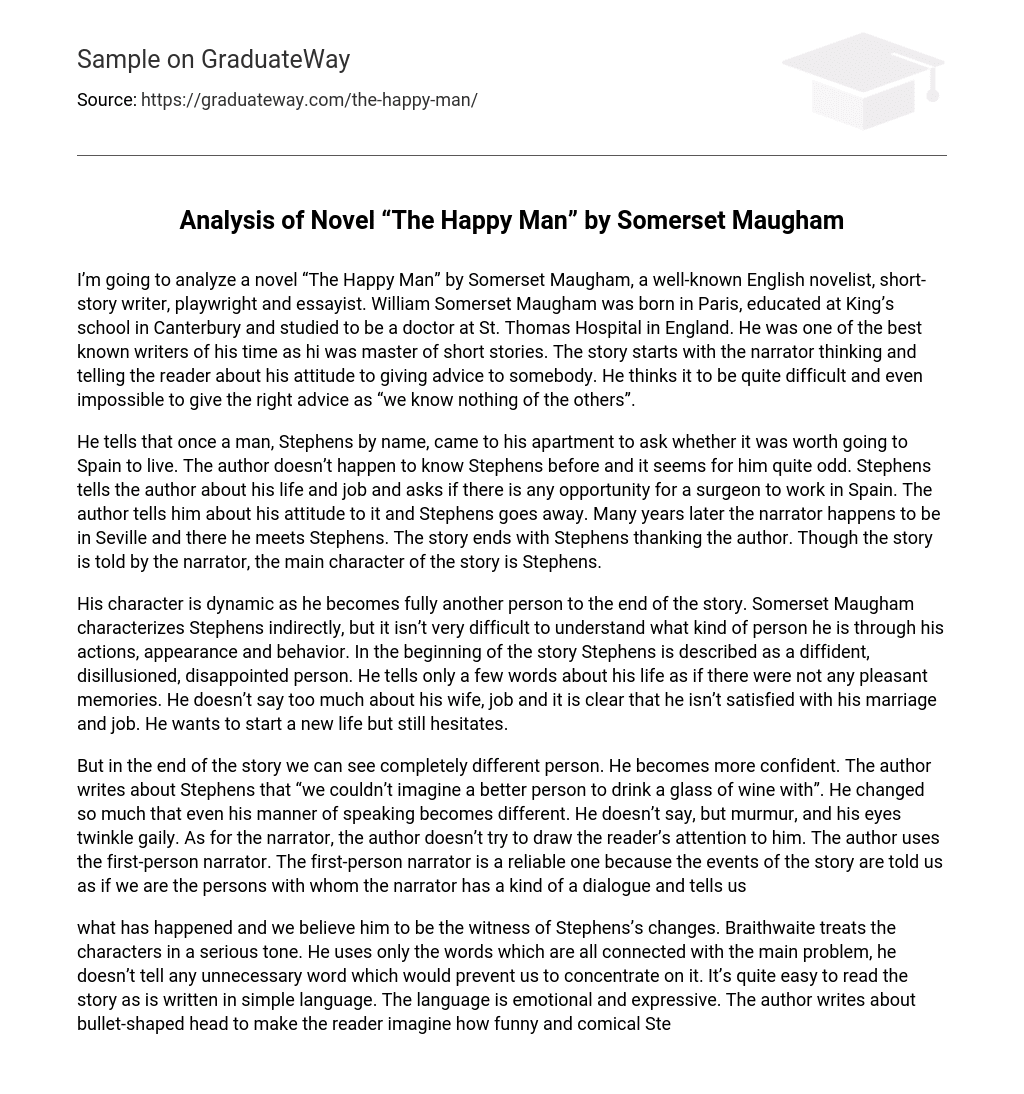I’m going to analyze a novel “The Happy Man” by Somerset Maugham, a well-known English novelist, short-story writer, playwright and essayist. William Somerset Maugham was born in Paris, educated at King’s school in Canterbury and studied to be a doctor at St. Thomas Hospital in England. He was one of the best known writers of his time as hi was master of short stories. The story starts with the narrator thinking and telling the reader about his attitude to giving advice to somebody. He thinks it to be quite difficult and even impossible to give the right advice as “we know nothing of the others”.
He tells that once a man, Stephens by name, came to his apartment to ask whether it was worth going to Spain to live. The author doesn’t happen to know Stephens before and it seems for him quite odd. Stephens tells the author about his life and job and asks if there is any opportunity for a surgeon to work in Spain. The author tells him about his attitude to it and Stephens goes away. Many years later the narrator happens to be in Seville and there he meets Stephens. The story ends with Stephens thanking the author. Though the story is told by the narrator, the main character of the story is Stephens.
His character is dynamic as he becomes fully another person to the end of the story. Somerset Maugham characterizes Stephens indirectly, but it isn’t very difficult to understand what kind of person he is through his actions, appearance and behavior. In the beginning of the story Stephens is described as a diffident, disillusioned, disappointed person. He tells only a few words about his life as if there were not any pleasant memories. He doesn’t say too much about his wife, job and it is clear that he isn’t satisfied with his marriage and job. He wants to start a new life but still hesitates.
But in the end of the story we can see completely different person. He becomes more confident. The author writes about Stephens that “we couldn’t imagine a better person to drink a glass of wine with”. He changed so much that even his manner of speaking becomes different. He doesn’t say, but murmur, and his eyes twinkle gaily. As for the narrator, the author doesn’t try to draw the reader’s attention to him. The author uses the first-person narrator. The first-person narrator is a reliable one because the events of the story are told us as if we are the persons with whom the narrator has a kind of a dialogue and tells us
what has happened and we believe him to be the witness of Stephens’s changes. Braithwaite treats the characters in a serious tone. He uses only the words which are all connected with the main problem, he doesn’t tell any unnecessary word which would prevent us to concentrate on it. It’s quite easy to read the story as is written in simple language. The language is emotional and expressive. The author writes about bullet-shaped head to make the reader imagine how funny and comical Stephens looks.
While talking with the narrator, Stephens gives an apologetic laugh and that fact proves him to be unconfident and doubtful whether to tell the narrator all his problems or not. The story also contains many metaphors, gradations and parallel constructions. In order to impress the reader and make him think about, the author uses many metaphors while telling us about the narrator’s thoughts about life and giving advices. Telling this the author uses highly emotional language. The syntactical pattern is not very difficult and it doesn’t do any difficulty to follow the main idea.
Somerset Maugham doesn’t use many details. Every used detail is important from the author’s view point and carefully selected. The story is devoted to the problem of human’s ability to change his life. For some people it is very difficult to live another life and they prefer to be in the same way all their lives. We shouldn’t be afraid of new changes, because “life is full of compensations”. If a person is afraid to take risks and change his life, he cannot expect to gain anything. So, as they say, he that fears every bush must never go birding.





